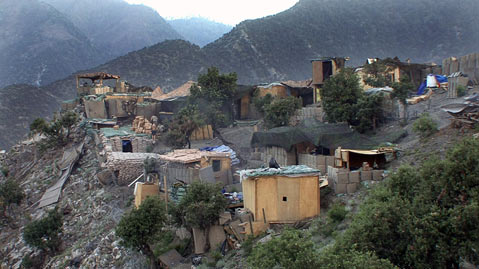
Given the recent hyper-buzz over WikiLeaks revelations and implications of official wartime malfeasance, timing may seem to be on the side of Restrepo, a remarkable “small” documentary about a specific slice of the Afghanistan War. But, in fact, part of this film’s power is its unwillingness to make glib judgments or assert moral stances in the course of its central action: chronicling a platoon’s valorous and difficult mission over the course of a year, ending in late 2009 in the turbulent, Taliban-infested Korangal Valley in Afghanistan.
What emerges is a rare, intimate insight into the life of American soldiers, as they process weapon-toting hubris, fear, and collective pride in the project at hand. The film, made by American journalist Sebastian Junger—on assignment with Vanity Fair—and British photographer Tim Hetherington, goes far beyond the casual “embedded writer” angle. In this forbidding and remote region, dubbed the “Valley of Death,” this platoon established a hilltop they called Outpost Restrepo, in honor of a fellow soldier, Juan “Doc” Restrepo, whose charismatic appeal hovered over the platoon, before and after his death.
We get sneak peaks at the personal lives of soldiers, interviewed after the fact, in clean, well-lit settings. The boyish-faced Pemble, for instance, is the son of an Oregon hippie mother who wasn’t allowed to eat sugar or play with toy guns as a kid. Now, he is disappointed that he couldn’t get a clear view of an enemy kill.
In one somewhat chilling but neatly illustrated cause-and-effect sequence, Captain Kearney addresses his troops after an attack has taken the lives of several soldiers. “I want you guys to mourn, get over it, and get on with your job,” he tells them. Consolation segues into militaristic pep talk, as when he encourages his troops to “make the people who did this fucking pay.” And they do: the film cuts to an exchange of fire in which Afghanis in the brush are dealt with in a hail of well-aimed bullets. “Direct hit! That motherfucker’s done!” says the shooter, with sadistic glee. What’s going around is coming around, in this protracted war and in the complicated business of “supporting our troops.” Those are among Restrepo’s underlying, compelling, and unresolvable themes.



